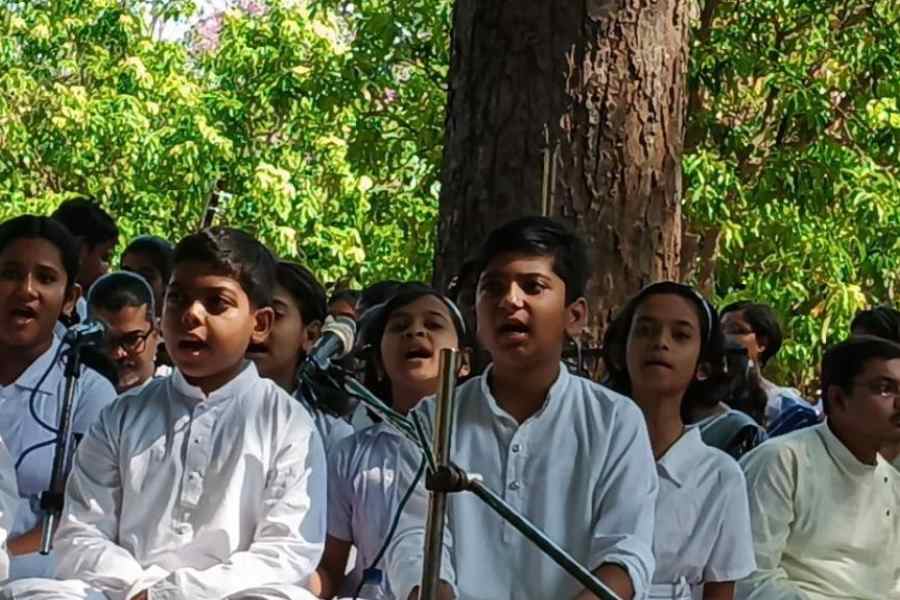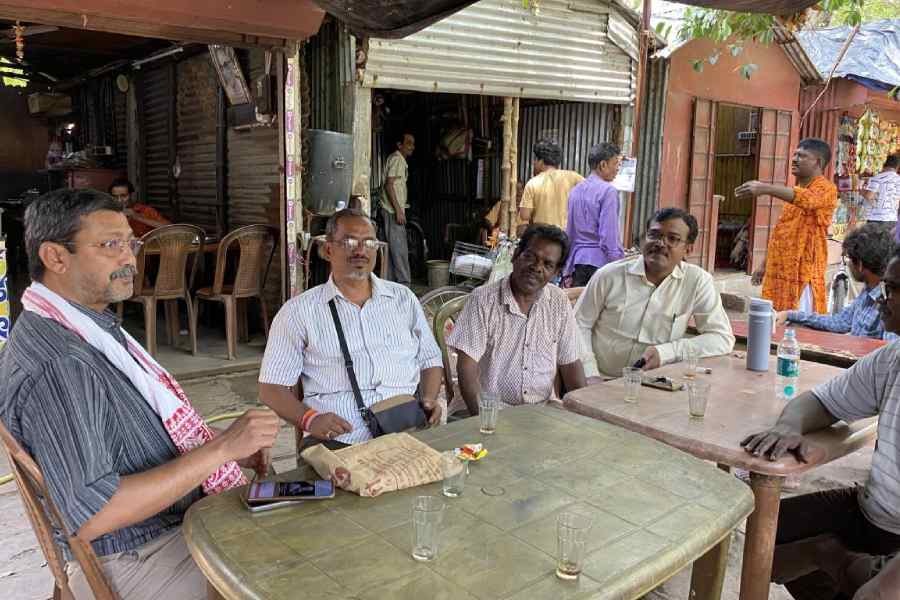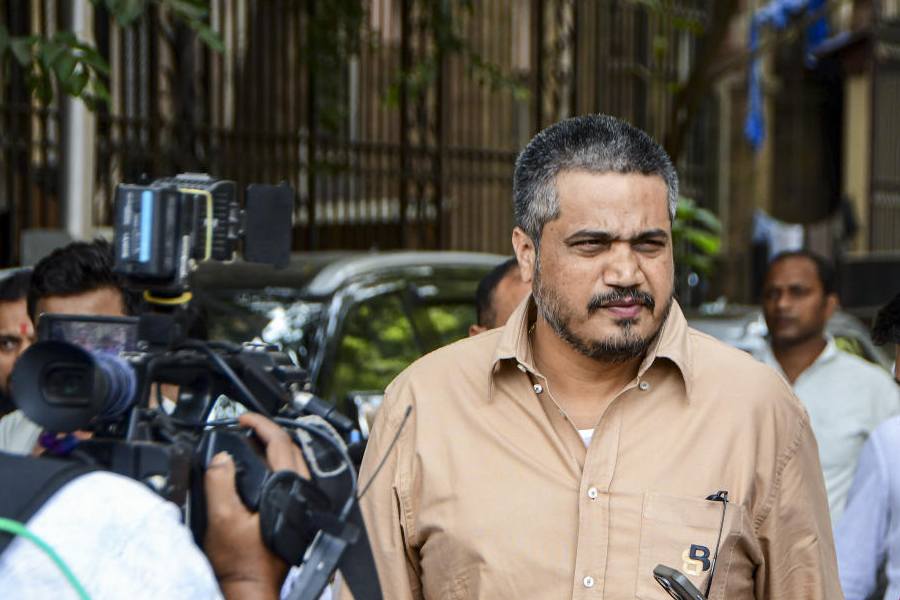Chiro nutoner dilo daak, pachishe Baisakh (It’s the call of eternal new, 25th day of Baisakh)....
The joyous refrain on Rabindranath Tagore’s 164th birth anniversary swirled in the air of Santiniketan, which falls under the Bolpur Lok Sabha constituency.
This gentle solemnity on the campus was in sharp contrast to the hurly-burly of the election campaign, visible and audible just outside the 1,130-acre campus. Only five days are left for two constituencies of Birbhum — Birbhum and Bolpur — to vote.
The Election Commission of India is making special security provisions for the district, notorious for its political violence.
Santiniketan, however, was an oasis of peace on Wednesday.
Students and teachers, dressed in white, took part in various programmes — Baitalik (a procession with participants singing Tagore’s songs) at Gour Prangan, a special prayer at Upasana Girha, the celebration of “Janmotsav” (birth anniversary) with a cultural programme by schoolchildren at Madabhibitan on the Patha Bhavana campus, and a cultural evening in the form of Tagore’s dance-drama — through the day. An important part of the celebration was steeped in nostalgia as Tagore’s voice was played through a music system from Rabindra Bhavana, the Tagore museum, from 6am.
“You can call this day our Pujo…. I attended the programmes on the campus. At home, I placed a garland on Tagore’s photograph and gifted a book to my son. My father also used to gift me a book on this day to encourage the spirit of learning, one of Tagore’s key ideals,” Kaushik Ghosh, a college teacher and Visva-Bharati alumnus, told this newspaper on the sidelines of an animated adda at a tea stall in Ratan Palli.
The tea stall — Subodh-er cha er Dokan (Subodh’s tea stall) — was abuzz with conversations after the morning programmes as students, teachers and Visva-Bharati old-timers dropped by for their cuppa and chats.
Students, teachers, alumni and varsity staff of different religions, ages, educational attainments and social status sat on the tea tables, making it a microcosm of Tagore’s universalism. It showed why Visva-Bharati, despite its falling academic standards, still remains unique and has so many things to offer to an increasingly polarised world.
At a table at the tea stall, where the average age of adda participants was 50-plus, Visva-Bharati’s garden department employee Bedan Ghorui sat next to Ghosh, a PhD in Bengali, discussing, in a free-wheeling adda, how unplanned growth in tourism had affected Santiniketan’s culture and ecology.

Students of Patha Bhavana, a school run by Visva-Bharati, celebrate Tagore's birth anniversary in Santiniketan on Wednesday. Sourced by The Telegraph
“We are a heterogenous group.... So many things, from religion to social status, are different among us. But we sit at the same table, share our thoughts and listen to each other,” said Ghorui, flagging the inclusive character and culture of Santiniketan.
Ghosh, academic in his approach, tried to explain the phenomenon by invoking Tagore.
“Visva-Bharati inculcated into our value system four key attributes — freedom of thought, logical approach, love for nature and human beings, and ability to co-exist even in diverse surroundings,” said the professor, explaining what makes Santiniketan unique.
“We have to preserve this unique character.... There have been talks about a Visva-Bharati master plan since the time of vice-chancellor Nimai Sadhan Basu from 1984 to 1989, but nothing happened. We want the local MP to take it up with the Centre so that Santiniketan can retain its character envisaged by Tagore,” said Ghosh.
At the adjacent table, a bunch of students aged between 20 and 21 concurred with Ghosh and agreed on the need for central support for the varsity.
“Our campus is different.... That’s primarily due to its strong cultural foundation, rooted in diverse Indian traditions. You will be amazed to know that when we organise cultural programmes, the participants are not only students from the performing arts departments, but all departments,” said a postgraduate student of history, flanked by two juniors, one learning the Kathakali dance form and the other Odissi.
Unlike some of the other campuses in the country, which have seen sharp schisms among students based on political ideologies or religious or caste identities, Visva-Bharati has largely remained insulated from these worrying trends.
“We are far better than other campuses.... But at times we feel bad as there is a tendency among the authorities to keep students from the Northeast states in a silo. We should set a benchmark of inclusiveness which is the basic tenet of Tagore’s philosophy,” said a student of Bengali literature.
As discussions veered towards campuses, developments in JNU over the last few years cropped up. Students were unanimous in their opinion that their peers in JNU were getting a raw deal due to political reasons.
“We are saddened to see efforts by the Centre to stifle the freedom of the student community at JNU because most students there do not want to subscribe to the philosophy that authorities currently want to propagate,” said a student of Sangeet Bhavana.
“This is so disturbing for us… We want campuses free from such interference,” said the history student.
Visva-Bharati had its share of problems for five years (2018-2023) when Bidyut Chakrabarty, accused of saffronising the campus, was at its helm. A section of students and the teaching community tried to resist his moves, which resulted in unprecedented conflicts on the campus. Chakrabarty also created a storm by targeting Nobel laureate Amartya Sen, the most celebrated alumnus from the campus, by levelling a land-grab charge on him.
“We feel freer after his departure.... It’s a relief as he was trying to change the DNA of Visva-Bharati,” said the history student.
“Did he (Chakraborty) know his own level? Was he aware of the kind of charges that he was levelling at someone of the stature of Professor Sen?” he asked, failing to hide the anger in his voice.
The grey-haired occupants at the adjacent table also briefly discussed the tenure of the controversial VC.
“We have been critical of Professor Chakrabarty for some of the things like his efforts to change the traditional cultural ethos here or stopping the Pous Mela or Basanta Utsav.... But we also hailed some administrative changes that he was trying to bring in,” said Ghosh.
“We didn’t have any hate towards him as Visva-Bharati doesn’t teach us hate.... We take a logical approach to assess his tenure,” he added.
Politics inevitably cropped up in the adda. There was near unanimity among all the age groups that the ongoing Lok Sabha polls were crucial for the country and a lot would depend on its outcome.
“Religion was always there in our country, but its use in politics had never been so extensive,” said Rajen Sarkar, an alumnus of the varsity.
“Visva-Bharati taught us to be tolerant towards all faiths.... Can’t we have more tolerance in this country?” he asked, as the students within earshot nodded in agreement.









